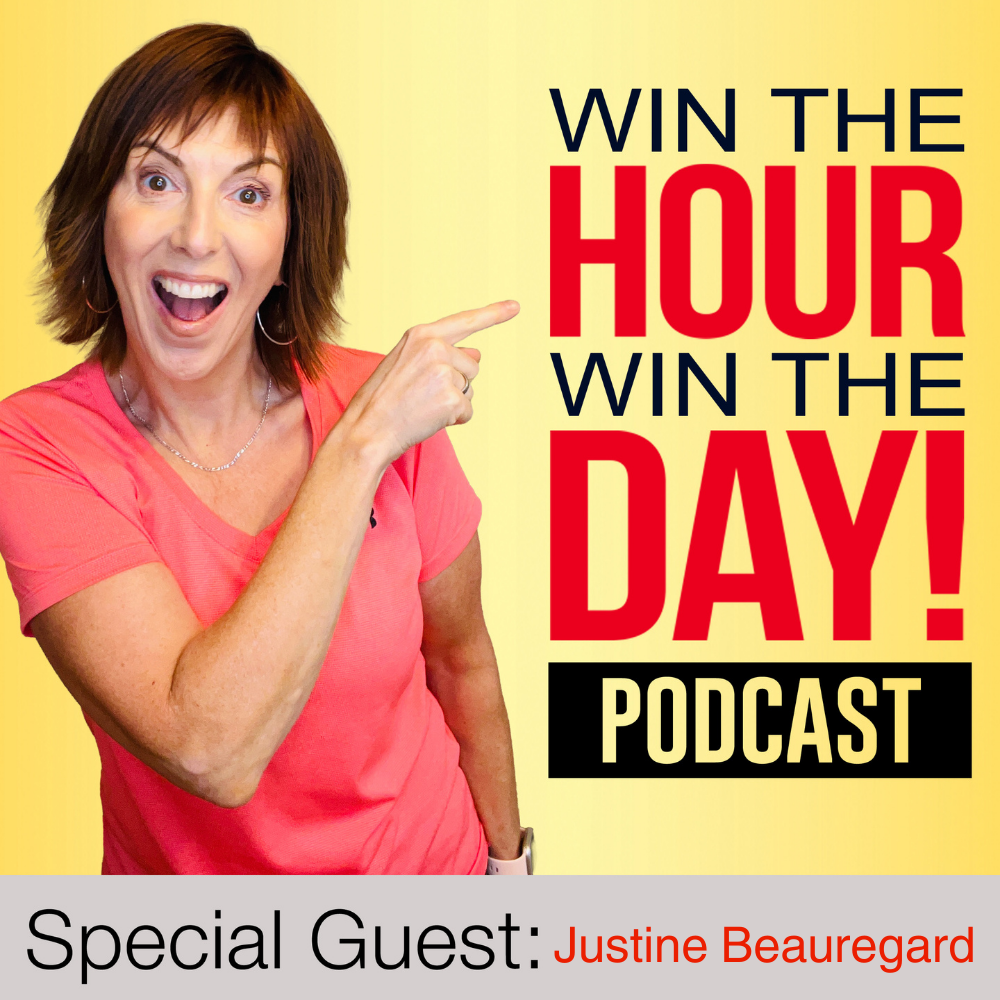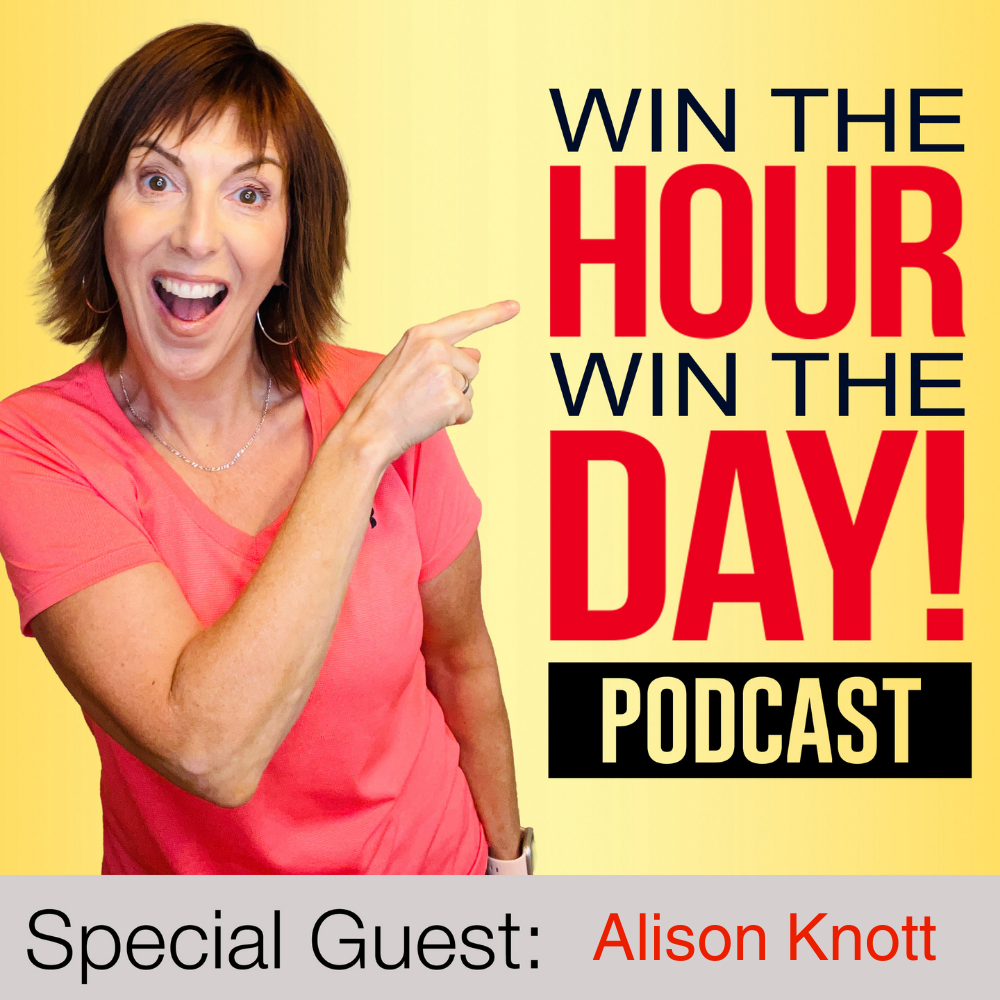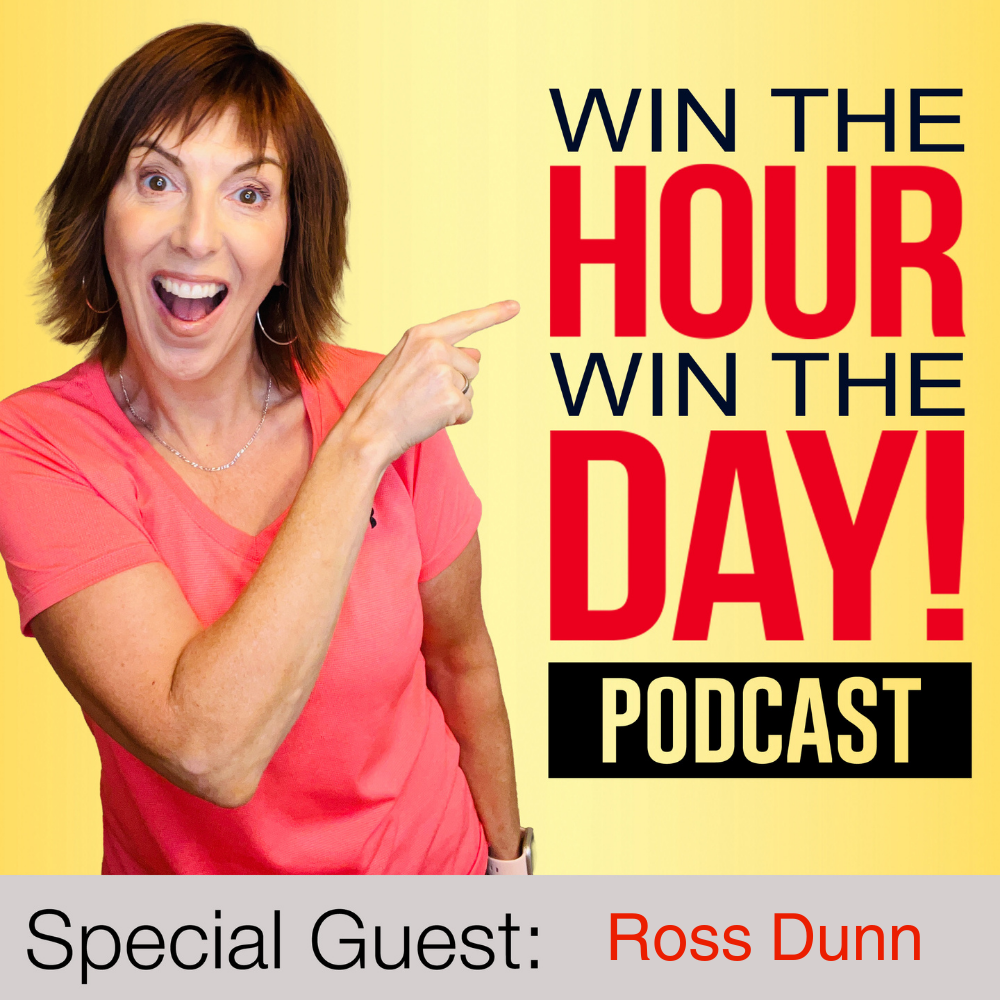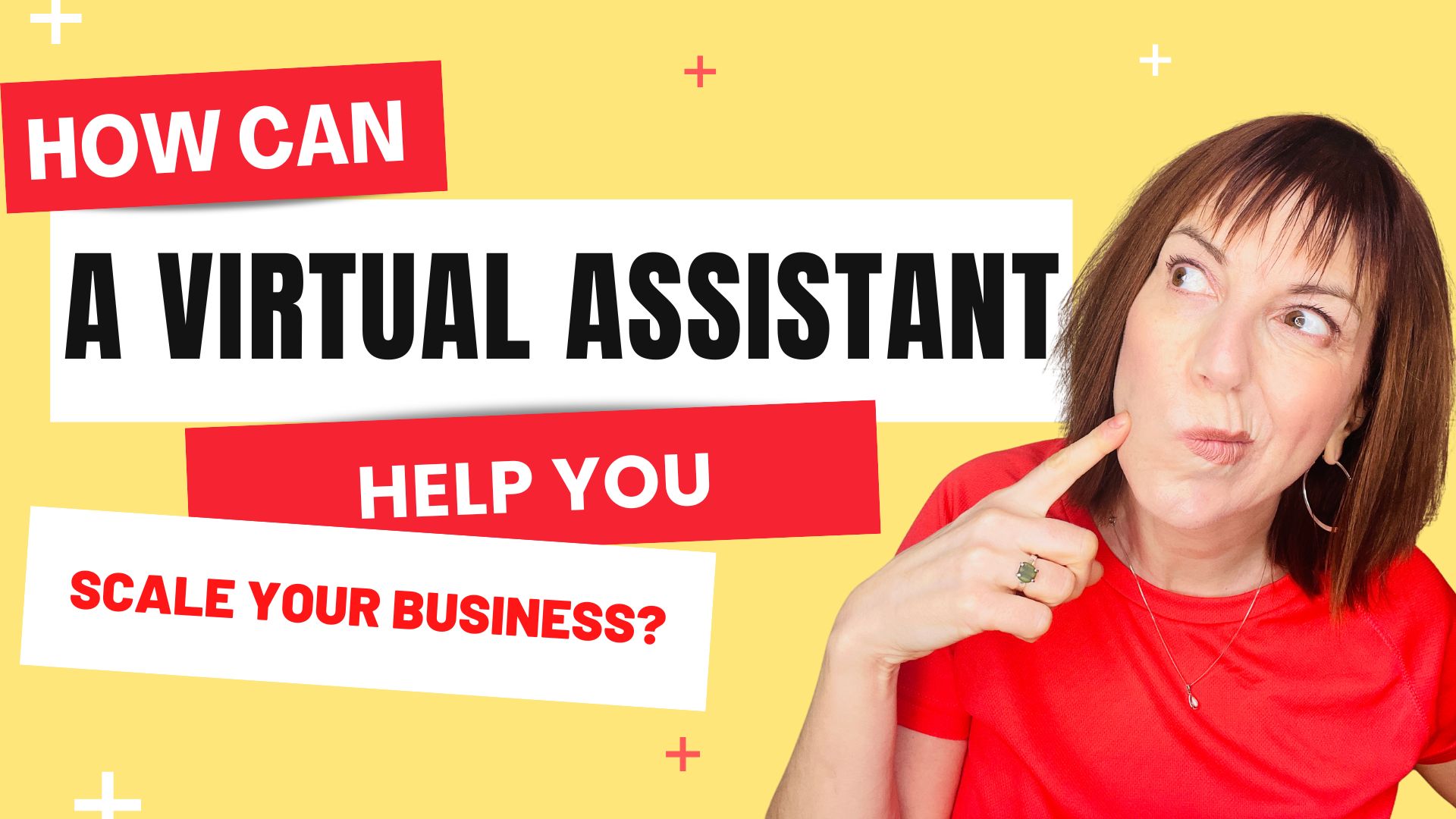Episode Summary
This week’s episode of Win The Hour, Win The Day Podcast is sponsored by Win The Hour, Win The Day’s Signature Coaching Program the Winners Circle. Kris Ward who helps entrepreneurs to stop working so hard interviews, Brooke Sellas.
Brooke Sellas breaks down the content creation process into 4 categories that you won’t find anywhere else. From insightful interviews with experts to real-world case studies, Brooke shares actionable strategies that you can implement right away to elevate your content marketing game.
Learn:
-The 4 categories of content you need to create
-Discover how the best brands differentiate themselves and how to apply their strategies
-Uncover the power of eliciting emotions in your content
-Gain valuable insights and actionable tips to elevate your content marketing
And much more!
Scale Your Business Scorecard
https://bit.ly/WinTheHourWinTheDayScoreCard
Win The Hour, Win The Day! www.winthehourwintheday.com
Podcast: Win The Hour, Win The Day Podcast
Facebook: https://www.facebook.com/winthehourwintheday/
LinkedIn: https://www.linkedin.com/company/win-the-hour-win-the-day-podcast
Win The Hour, Win The Day Winners Circle: https://winthehourwintheday.com/winners-circle-masterclass
You can find Brooke Sellas at:
Website: https://bsquared.media/about-us/brooke-sellas
Win The Hour Win The Day
https://winthehourwintheday.com
Brooke Sellas Podcast Transcription
[00:00:00] Kris Ward: Hey everyone, welcome to another episode of Win The Hour, Win the Day. And I am your host, Kris Ward. And today in the house we have Brooke Sellas.
[00:00:06] And I am really eager to dive into this cuz Brooke talks about the digital experience. But she’s gonna show us really about how fundamentally that we’re all doing social media wrong. And in the few seconds I spoke to her, when we started diving into this. I’m doing it wrong too, and it’s gonna be quite a turnaround for me to figure this out because it’s been something I struggle with and I’ll tell you why as we dive into this. So let’s get to it. Welcome to the show, Brooke.
[00:00:32] Brooke Sellas: Thank you so much for having me. I’m so excited to talk to you. I’ve listened to several episodes and so I’m just thrilled to be here.
[00:00:41] Kris Ward: Oh, excellent. So flattery will get you everywhere with me. So that’s a great place to start. . I’m easily persuaded. Okay, so we talk about, now this is your thing, so forgive me, whatever the title is, but we talk about social media in the category of cliches, facts, opinion, and feelings, and so what does that fall under the umbrella of?
[00:01:02] Brooke Sellas: It’s a social strategy. So when you think of social media you fuel your social media presence with content. Most content out there, we can all go look right now and most content lives in those first two disclosures, cliches and facts.
[00:01:16] Kris Ward: Okay.
[00:01:17] Brooke Sellas: Unfortunately, based on the theory that I pulled this from for my undergraduate thesis study, which let’s just call it the Onion Theory. That’s its nickname. It’s a much better name. The third and fourth levels of that onion, peeling the onion back and getting to the core of the onion, like actual true connection with your targeted audience happens with opinions and feelings, content. But when, again, look at most brands they’re only sharing cliches and facts. And this is why I think a lot of people say, I’m not getting a return on investment or social media doesn’t work.
[00:01:48] Kris Ward: Okay, so here I don’t even know what we mean by cliches. First of all, let’s deal with that. What do you mean by a cliche? I know what a cliche is, but what do you mean by it in this component?
[00:01:56] Brooke Sellas: Let’s go through it. So a cliche is obviously something that it’s not really an important information. It does nothing to move the relationship forward. I’ll give you an example. Let’s say you and I work together and we get in the elevator one day together and I’m having the worst week of my life.
[00:02:12] And you Kris say, how’s it going? And I go fine. Even though I’m having the worst week of my life, I told you fine. Which was totally cliche because I’m not interested in this scenario.
[00:02:24] Kris Ward: Yeah
[00:02:24] Brooke Sellas: In moving the relationship forward, I don’t wanna disclose any personal information to you.
[00:02:29] Kris Ward: Okay.
[00:02:30] Brooke Sellas: So then facts are interesting because we all know what a fact is, right? A factual piece of information, but according to the Onion theory, it is not a fact unless it is significant and not otherwise known. So if I sat here and told you my name was Brooke, you’d be like, cool. I already know that , right?
[00:02:50] That’s not necessarily a fact, but if I told you that my name was Jennifer Brooke but I’ve gone by my middle name since birth. That’s a fact that’s disclosing information to you that’s not otherwise known signaling that I want you to know something a little more personal about me.
[00:03:07] Kris Ward: Okay. So my brain went to, like a lot of my clients tell me in the Winners Circle that when they start working with us, they get 25 hours back a week within the first month of working with us.
[00:03:16] Brooke Sellas: Wow, that’s great.
[00:03:17] Kris Ward: Is that a fact or and I’m just throwing it out there and it doesn’t mean anything. Or like where does that fall under this?
[00:03:26] Brooke Sellas: It could be a fact, but it also depends on how they present it, right? And so I talk about this a lot too. Like a lot of reasons why brand content is cliches and facts is because they’re often talking about features.
[00:03:38] But what you just mentioned was a benefit, right? And benefits are how customers feel using your product and service.
[00:03:47] Kris Ward: Ok.
[00:03:47] Brooke Sellas: So in that particular instance, it was them disclosing and really an opinion or a feeling to you, even though it was packaged into what looks like a fact.
[00:03:55] Kris Ward: Ok.
[00:03:55] Brooke Sellas: Because they’re telling you the benefit of being a part of that Winner Circle.
[00:03:59] Kris Ward: Okay. So then opinions and feelings. This is where I buy into everything you’re saying because I think here’s where my roadblocks went up, and I know I’m doing it wrong. I know this is an issue for me. So opinions, first of all, I think if I was talking to you and we’re just laughing and joking and I might be a little bit witty or saucy or say something that within the frame of this relationship, hearing the tone of my voice or whatever.
[00:04:24] You knew it was meant this way. But I’m very mindful when you put stuff out on social media that your opinion has to be very carefully, I think worded or all of a sudden people are misunderstanding it and you’re getting heat for things. Here’s a quick example. So I talk about how, let me tell you four stories at once.
[00:04:44] So pay attention here, Brooke. Because I’m about to argue my own, I’m about to a, I don’t need you cause I’ll argue against myself, right? So I do understand that opinions matter cuz they distinguish you from others and then you have to have an opinion or how do you stand out?
[00:04:59] So I had done a blog or something, a video about how we had students come through here. We’ve had maybe 30 students now, and the schools like we have a waiting list at one point because they say the students come in and they leave differently and let they come cuz we treat them like real adults. And a lot of ’em had said to me, oh my gosh, I wouldn’t have been ready for college had we not done, had I not been here?
[00:05:19] Like it’s life changing for them. Fine. Yeah. So I put this video thing up on social media talking about, “hey, like you get like 200 free hours from these schools because the kids come and they’re like very tech savvy cuz they were born into this world now like that and grade 11 and 12” and that’s fine.
[00:05:34] And then, they’re thrilled because they’re not in school, they’re doing it in co-op placement, even though it’s virtual, that’s fine. So they love it. They’re not getting homework, they love it, whatever. So then I get this big pushback and people are like, I’m exploiting people and I’m asking for free labor.
[00:05:48] And I’m like, ah, yeah. Now I didn’t care. I was like, okay I get it. You’re missing the point and you’re just, you’ve got more time than I do. . But if the opinion isn’t very careful sometimes being funny in front of one person or being, having a conversation, one person or a hundred is totally different.
[00:06:05] So I think I’m more guarded about my opinions because I think you’re throwing it out to the masses and then you don’t get to respond like you’re having a one-on-one conversation. So I think I am missing that opinion thing, which if I’m doing that, then what’s the point? Because I’m just like everybody else.
[00:06:20] Brooke Sellas: Well, three things. To have any relationship that you have now, whether it’s personal or professionally, you probably had to get vulnerable at some point to get to that wonderful relationship that you have. So I think people need to understand, first and foremost, you have to be ready to be vulnerable. And that is scary.
[00:06:38] I get it. I’m asking something that’s not that easy. Number two is that dissolution is a good thing, right? When people don’t agree with you, they didn’t agree with what you said, that’s okay. You can tell them “Thank you for, sharing your side. Thank you for sharing your voice.”
[00:06:55] Because we all have a voice and we all have an opinion. And that’s the thing. Opinions are just opinions. Everybody has one. You don’t, you’re not asking them to agree with you. And if they go away because they don’t agree with you, that’s really good cause on social media, you should be building
[00:07:10] Kris Ward: Right
[00:07:11] Brooke Sellas: a customer base, not a follower base. We all get trapped into the vanity metrics of how many followers do I have? I don’t care if you have 10. If those are 10 people who are aligned with your message, aligned with your opinions and your feelings, and who are going to eventually buy from you, that is way better than a page with 10,000 followers.
[00:07:31] Kris Ward: You’re so right. Yes. We might as well just be clear and cut the relationship now. Cause if you don’t get me, not only do I not need these vanity metrics, but I don’t wanna work with you. Because there are people that I have wanted to be in the Winners Circle and I’m like, like one guy was like, listen, I think nobody can do it like I do and I don’t trust people.
[00:07:49] And I say I can’t help you. Like I can’t change your framework of the world. Yeah. You’ll not fit in the Winner Circle. Let me just tell you that right now. This is not a match. So you’re right. I don’t wanna work with them. Getting to the vulnerable part, I don’t, yeah, that’s a problem. . So I’ll tell you why.
[00:08:03] Brooke Sellas: Okay. So let’s start here. Let’s start here. I’ll give you an example. Okay. B2B Marketing Solutions on LinkedIn. I think they’ve since rebranded to LinkedIn ads. It’s not quite the same name anymore, but you’ll see them if you go search for LinkedIn on LinkedIn. They are so great at putting out opinion and feeling con content.
[00:08:21] So here’s an example of what they did. We’ve reduced the budget. And then it says, name another four word marketing horror story. And all these people commented with their opinions on what a four word horror story about marketing would be about. Meaning you’re getting an insight into what is their top concern right now in the moment.
[00:08:45] They can then take all of that voice of customer data, opinion mining, if you will, and create content addressing those pain points as LinkedIn marketing solutions or LinkedIn ads or LinkedIn as the solution and what those benefits would be, how people would feel, not scared if they use LinkedIn to combat whatever that horror story was.
[00:09:07] Kris Ward: Okay, so they asked for a four word horror story?
[00:09:10] Brooke Sellas: Yeah. So they said, we’ve reduced the budget, which is three words, and then they said, oh, we’ve reduced the marketing budget.
[00:09:18] Kris Ward: I gotcha. I gotcha. Okay.
[00:09:19] Brooke Sellas: And then they said, what’s your four word marketing?
[00:09:23] Kris Ward: I gotcha. I, once you throw math into it, Brooke, I’m out. I was thinking it had to be.. I was thinking it had to be a word with four letters.
[00:09:29] Brooke Sellas: No.
[00:09:29] Kris Ward: I’m like, I don’t even know what those words are. What is it? Like chat, C H A T. I don’t know. Okay. I got you.
[00:09:35] Brooke Sellas: That’s fine.
[00:09:36] Kris Ward: I derail those people here just cuz I’m not very smart. I got you back. Okay.
[00:09:39] Brooke Sellas: No. I’m not a Mather. I am not a mather.
[00:09:41] Kris Ward: Okay, so they had engagement there and you would put that under the category of opinion. Is that what you’re saying?
[00:09:46] Brooke Sellas: Yeah. Cause they’re asking, share someone to share their opinion. Ok. So you can have opinions and feelings, two ways you can elicit them, meaning you share how you feel or what your opinion is, or you can solicit them, which means asking your audience, their opinion or how they feel about something. Obviously adjacent to your brand or your industry or what you do.
[00:10:09] Kris Ward: So in my case, I find that the people I work with have been in business at least five, 10 years, and they are, they look good on paper, right? It could be someone just like you. It’s oh, she looks good on paper. She’s got a book, she’s on podcast.
[00:10:20] She’s doing great. But no one person knows how many hours you’re still working at this point in your journey. So for me, I find they’re not going to fess up onto that. A – first of all, they often think once I get past this next thing, things will be different. And like until they wake up one day, and I how long have you been saying that?
[00:10:37] Once I get the book out, once I get this out once I get past the holidays, whatever, there’s always a once eye. So to get them to respond back is . A – they might not be self-aware and B – they don’t wanna be publicly known for that they’re still grinding it out. So I guess I just need to get their opinions on something else. Engage them in some other way.
[00:10:54] Brooke Sellas: Yeah. And think about it this way. So what’s an onion? If we’re talking about the Onion Theory, if you peel an onion right, there’s breath going around the onion, the roundness of it. Yeah. And then there’s depth, peeling those layers back to get to opinions and feelings. Or ultimately feelings. You have to be good at both which means you still have to have those breath conversations, those easy peasy, breezy, light conversations happening. Because every time you add someone new on social as a follower, they’re not gonna wanna go right to feelings, right? So you have to constantly think about breadth and depth of their content.
[00:11:30] You have to have content available for opinions and feelings, it’s a little bit deeper, a little bit more vulnerable, but you also have to have the light and fluffy too, because you have to condition people to get to the onion, right? The core of the onion with you.
[00:11:43] Kris Ward: So when I wrote my book, I’m telling you, people had to tell me 1000 times. Like it really, they like till I, I couldn’t take it no more. I didn’t wanna talk about the fact that the book came of my husband passing away, or I had been away from my business. Cuz first of all, I, everybody has a story. And when people would bestow sympathy upon me after my husband passed away, I would say, listen, everybody has something.
[00:12:09] This is my something right now. So in one way it’s because I really do think there’s people dealing with all sorts of things that are more difficult than I was dealing with. And there was a lot of positives, and I’m just a very positive person, so I wasn’t crippled by it. I’m not saying it was easy, but I’m just saying I looked for the anything I could find in any moment, and I didn’t want the sadness or negativity on me.
[00:12:31] I didn’t want that to define me or especially him because he was so much more than that. So I didn’t want to say this is, I was just, people are like Kris you cannot just stick this book out there. You’re just gonna be this productivity person. They’re not gonna get it. You have to tell the story and like I was drunk, kicking and screaming.
[00:12:48] I was like, all right, I’ll try it once. So that and I still think, not that I gloss over it, but I don’t give it the depth that maybe somebody else would. Cause here’s the thing, I don’t wanna be whining and crying anywhere. I don’t like that feeling. It’s not how I deal with my life hour to hour, and I’m not really good with these people.
[00:13:08] Okay, let me just tell you what a flawed human being I am. Somebody that I respected and is a significant person in their industry and they’re online and I’ll at least say that they’re a branding type person and they’ve been on big stages. I really like them. They had books and everything. Their dog was going to have to be put down.
[00:13:26] They’ve put the video up in the vet and now we’ve got a two minute video of him clutching and crying onto the dog as they pull the dog away from him to put the dog down. Now, I’m sure I’m not judging the man for crying. It was an intimate moment, but I’m not entirely sure what possessed you to post it on Instagram, and I don’t know what to do with that.
[00:13:49] And, I so not wanna be that person that I think I go the other way and I’m can come off distant and non-caring.
[00:13:58] Brooke Sellas: Sure.
[00:13:58] Kris Ward: It’s cause I do not wanna be crying like that for nothing.
[00:14:01] Brooke Sellas: And I think I’m so glad you brought this up, and that’s such a wonderful story because there’s a difference between being vulnerable and abusing vulnerability.
[00:14:11] Kris Ward: Right. Okay.
[00:14:12] Brooke Sellas: Some people, some marketers, same as you. Big stages, lots of books, really great, inspiring, but they abuse that vulnerability. They manipulate it so that they can get more feelings. I think though, and I’ve just heard and seen, with these, with some of these marketers that people start to think it’s inauthentic. So
[00:14:32] Kris Ward: Yes
[00:14:33] Brooke Sellas: as long as you’re being vulnerable and authentic, combining those two, you can’t lose. You can’t lose, ok. So you can’t abuse what’s happening. But it was absolutely part of your story and it was absolutely appropriate for you to share that because so many people could probably relate to you.
[00:14:49] I can relate to you. I didn’t lose a spouse, but I can understand. Having things happening in, in my personal life that are very stressful and very take a lot of my time and still having to run a company. So that for me would’ve just helps me align with you even more. But it’s authentic. You weren’t abusing it.
[00:15:06] Kris Ward: Okay.
[00:15:07] Brooke Sellas: So I think that’s the key there. Don’t, when I say be authentic, I don’t mean post your crying video on. Instagram that is not…
[00:15:15] Kris Ward: Because that was me too. I’m thinking it, it’s sad enough that maybe, okay, maybe you thought when you put the camera there, that wasn’t gonna go as bad, and so that caught you off guard, but you made a decision to go home and then post that up there, right?
[00:15:28] So that’s where it gets really raw. So this is really enlightening to me because I have struggled with this for a long time. Because also hour by hour, I am a very positive person. I am not somebody that buckles easily and cries, and I did find the positive in every single moment, even with him, right?
[00:15:44] So I’m so thankful on so many levels. So then I thought, oh no, I have to make this leap of this person who I’m not by hour crying and needy because now I have to woes me. And here’s the thing. So I’m not sure if I’m just not a bright person, but it’s been a long life and I didn’t understand that being vulnerable.
[00:16:02] It doesn’t mean being raw and exposed. It means, just opening up a little bit more than I normally would, but I don’t have to go deep and go ugly so I can share things that may have been a little bit more difficult for me in the capacity that I would with if I was just talking to you here.
[00:16:21] Brooke Sellas: Yeah. Now imagine you were talking about how CEOs don’t wanna talk about like how much or how little they work. And I’m with you cuz that’s me. I managed. I used to work 80 hours a week, crazy hours, and now I work probably 30 to 40 hours a week. I’ve really done. And it took a lot of time and a lot of work to really get more of that work life balance.
[00:16:42] But imagine I was part of that group and you just kept asking people like, what’s the appropriate amount of hours to work? How many hours did you work this week? How many of you are working more than you want to be? And you finally get someone like me who comes in and says, look, I used to work 80 hours a week, but now I work 30 to 40.
[00:16:59] Sometimes I log in 27 and yeah, do I feel like a twinge of Ooh, gosh, I feel like I didn’t work enough this week. I do, but then I have to remind myself that some of my best creative things come when I’m taking a walk or riding a horse or something completely away from work. Once you start to get those people, you’re moving down to that depth part of the onion.
[00:17:20] Once you start getting people to go there with you, other people will feel more inclined to share. . Cause they will be aligned with not only you, but the other people in that group.
[00:17:31] Kris Ward: This is powerful. Okay. Because my husband used to say I would, it was a character flaw. It was actually… this is a funny story.
[00:17:39] Many years ago I was at this like networking breakfast thing, right? And this person had said to me, Kris, you’re really fun and very likable but it takes a little while to get to know you cuz like we go to these networking things and you talk business, which I thought of what the hell we were there for.
[00:17:52] But anyhow. And he said, some people find you a little cold, they don’t get to know you. So I had come home and I was all annoyed and I was like, whatever. This is crazy. What the hell are they looking for? Is a business breakfast? What are we talking about? And so my husband said, you do know he can’t take a course on being warmer, right?
[00:18:08] Like you get that. This is not, what do… you understand this, right? So I was like, oh, now I have to be warmer. What course is that? So I think I confused… he used to say, cause I would say it wrong. I’m vulnerable and I still struggle with the word vulnerable and he’d say, you don’t even know how to freaking pronounce it.
[00:18:25] Right. . So I think I just thought that was that the pendulum swung the whole way. So what is vulnerable for me is different than what it is for you. Yeah. And as long as I open myself up and I start sharing it a little bit more and everything, which I have learned, like now, I went Rock climbing for the first time last week and my team has beat it into my head that they’re always like if oh no I better come back with a story about this, I better come back with a video.
[00:18:48] Whereas before, I would’ve never yeah done that cuz it was just like my weekend. Who cares about that?
[00:18:53] Brooke Sellas: Your personal time.
[00:18:54] Kris Ward: Yeah, my personal time. Okay, so
[00:18:56] Brooke Sellas: I have a tip for you really quick though.
[00:18:58] Kris Ward: Go ahead.
[00:18:59] Brooke Sellas: At the networking breakfast or the party, instead of saying, what do you do? Say, what do you do for fun? That
[00:19:05] Kris Ward: Yeah. Yeah.
[00:19:05] Brooke Sellas: That’s going to get them to share opinions and feelings with you right off the bat, and then you can move into work talk. But they’ve, you’ve already aligned based on if you come to me, up to me at the network where you said, what do you do for fun? Oh, I horseback ride. And you’re like, oh my gosh, I a horseback ride.
[00:19:19] So then we’re aligning and we can get into what we do and make a connection. But I’m not gonna remember you because of your book or your company. I’m gonna remember that’s the cool woman who also writes horses and does stop to me. And she says, and she works with CEOs like me, right? But that first thing, that vulnerable piece of information that you shared will be what I hold onto.
[00:19:39] Kris Ward: It’s so simple. I always tell people your strength is also your weakness. So I am organized and structured, but that can be very limiting at times. . So when I do meet people where they wanna be on the podcast and we’re doing an intro meeting, I do wanna have something from them that reminds me, later, like you, so sometimes I would say, just tell me a fun fact about you because I wanna put down like they just got a new cat, so it’s in my notes oh yeah, that’s the one that got the new cat.
[00:20:05] So I know, but it was still awkward and clunky. But what do you do for fun, everybody attempts to have fun, so now I’m gonna get a more sincere answer instead of them looking at the ceiling or what’s something everybody doesn’t know about you and now you’re looking at the ceiling and it just takes the answer isn’t as interesting. It takes longer to come out and it feels like work.
[00:20:22] So that is a really good one. All right. Okay. You talk because I have nothing to say. I just learned a whole bunch of stuff. I’m like, it’s changed my whole attitude of life.
[00:20:31] Brooke Sellas: We didn’t get to feelings, but feelings, again, a lot of people think I don’t wanna go on social media and talk about how I feel.
[00:20:36] Yeah. And that’s understandable. But remember the benefits of the products and services you provide are how people feel using that product or service. So yeah, you’re gonna have to talk to some customers. I hope you’re doing that already. But if you aren’t, start. Because you’ll start to ask them like, what did using, what did you get out of reading Win The Hour, Win The Day.
[00:20:59] What was the number one piece of advice you did? How did you feel about this section in the book or what was your overall feeling when you finished the book? And even if they say something like guilty, I felt guilty because I realized that in, I was feeling guilty when I wasn’t working 40 hour weeks.
[00:21:16] But really I should be guilty saying, oh no, why did I fill that day? I only worked 27 hours that week, so I felt like I had to work that Friday to fill the hours, but in reality, I should have felt guilty that I didn’t go ride my horse or spend time with my kids or go on a dayday with my spouse.
[00:21:30] Kris Ward: I think too, so here’s something that comes up a lot, which frustrates me to knowing, cause I think it’s very sad, is that a lot of the people I work with they’re the go-to person for a lot of people in their life. And they’re smart and they get a lot of stuff done and then they realize, oh, I should not be working this many hours at this point in my journey.
[00:21:47] And so then they start to look for character flaws. Like maybe I’m just not also organized. I thought I should be more disciplined. I need, whatever. And then all this internal blame, cuz it must be them cuz everybody, whatever, . And so that to me I might write a post about stop blaming yourself.
[00:22:01] You just don’t have the systems in play. This is what you could do. But if I took that same story and I re edited, so it came from a feeling perspective of you’re, I felt like that too. I’m like, wow, I thought I was organized. I thought I was smart, and I didn’t realize that. Organize.
[00:22:15] You just reorganize the same stuff. I wasn’t growing. So if I can make that story with a feeling spine, a backbone to that, it could be the same thing. And I could not add the feeling, but pull the feeling out.
[00:22:27] Brooke Sellas: Yeah. And guilt is a feeling. Blame is a feeling. Yeah. But what’s the opposite of guilt or blame?
[00:22:31] Freedom. Yeah. What are some of those feelings? And again, talk to your customers. Are the people are in your Winner Circle.. Get their words and then use their words and tell their stories using those words, and then talk to the reader and say, you are feeling guilt, you’re blaming yourself for X, Y, Z.
[00:22:49] But you just read three stories about what can happen when you come up with these processes to manage your time better.
[00:22:58] Kris Ward: Now I’m feeling ashamed because it was up about five minutes before I this call that I realized you had a book. Is this what’s expanded on in the book?
[00:23:06] Brooke Sellas: Yes. Yes.
[00:23:07] Kris Ward: Okay.
[00:23:08] Brooke Sellas: So the book is Conversations That Connect.
[00:23:10] Kris Ward: I would’ve freaking read the book if I’d known you had one, cuz I do that. But I’ll be reading it now.
[00:23:14] Brooke Sellas: I’ll send you one. I’ll send you one. Okay. And essentially part one’s like really the psychology and like understanding why we are the way we are as humans. We’re very complicated creatures but part two really gets tactical and tells you how do you create this content. I give a lot of brand examples and case studies and show you like, here’s both sides of it.
[00:23:34] Here’s Pin and Jerry’s, which does have that risky political feeling and opinion content, right? That’s one way to go. But then there’s also Chick-fil-A who has a totally different stance from Ben and Jerry’s, but does very well with their audiences and constantly scores some of the highest fast food scores because again, they’re not worried about dissolution, they’re not worried about building follower bases. They are building customer base.
[00:23:59] Kris Ward: You’re right. She came on the show, so I can tell her she’s right. . She wrote a thesis.
[00:24:03] Brooke Sellas: I did…
[00:24:03] Kris Ward: Lemme tell you in 20 minutes. You’re right. Cuz even when you watch those Super Bowl commercials, whatever, Budweiser, and you’re like, and the dog and the horse got reconnected and what do I care about the dog or the horse or the beer? But now we’re all in it.
[00:24:16] Brooke Sellas: Yes. The best brands sell feelings, not products. Apple, they don’t sell phones. Yeah. They sell exclusivity, right? You’re part of the Apple Club and you’re an Apple fan, and you’ve got all the best products out there best, according to Apple, right?
[00:24:29] Gucci. If they don’t sell clothes, they sell luxury. Oh, if you have Gucci, you must be in the upper echelon, right? You’re fancy, right? Mercedes, they don’t sell cars. They sell status. If you drive a Mercedes, again, you’re in that upper level of people, so you need to think about how to sell your business as the feelings that your business is. Right?
[00:24:52] Kris Ward: You’re all kinds of smart. Okay. My gosh. I don’t need, okay. All right. Where can people, they gotta read your book. I have to read your book. Yes. They have to read your book. Okay.
[00:25:00] Brooke Sellas: I would highly encourage that. Yeah. Yes.
[00:25:03] Kris Ward: Where can we find more of your brilliance?
[00:25:05] Brooke Sellas: So if you go to B as in Brooke, the letter B squared, S Q U A R E D.media, it’s a not com, B Media, you’ll find me, you’ll find the book, you’ll find all the places where we’re active.
[00:25:20] Or if you’re like me and sometimes you can’t remember things that are a not com just Google Brooke Sellas B R O K E S E L A S, and I’m pretty sure I’m the only Brooke Sellas on the planet, so you’ll be able find all my things.
[00:25:34] Kris Ward: There you go. All right, you’re definitely memorable. That’s for sure. And it’ll be in the show notes, everyone, and please do share this show with just one other business buddy. They need to hear it. Oh my gosh. Just do that. Do them a favor. Everyone else, we will see you in the next episode. And Brooke, thank you so much. The time just flew by. We appreciate you.
[00:25:51] Brooke Sellas: Of course. Thank you for having me.










